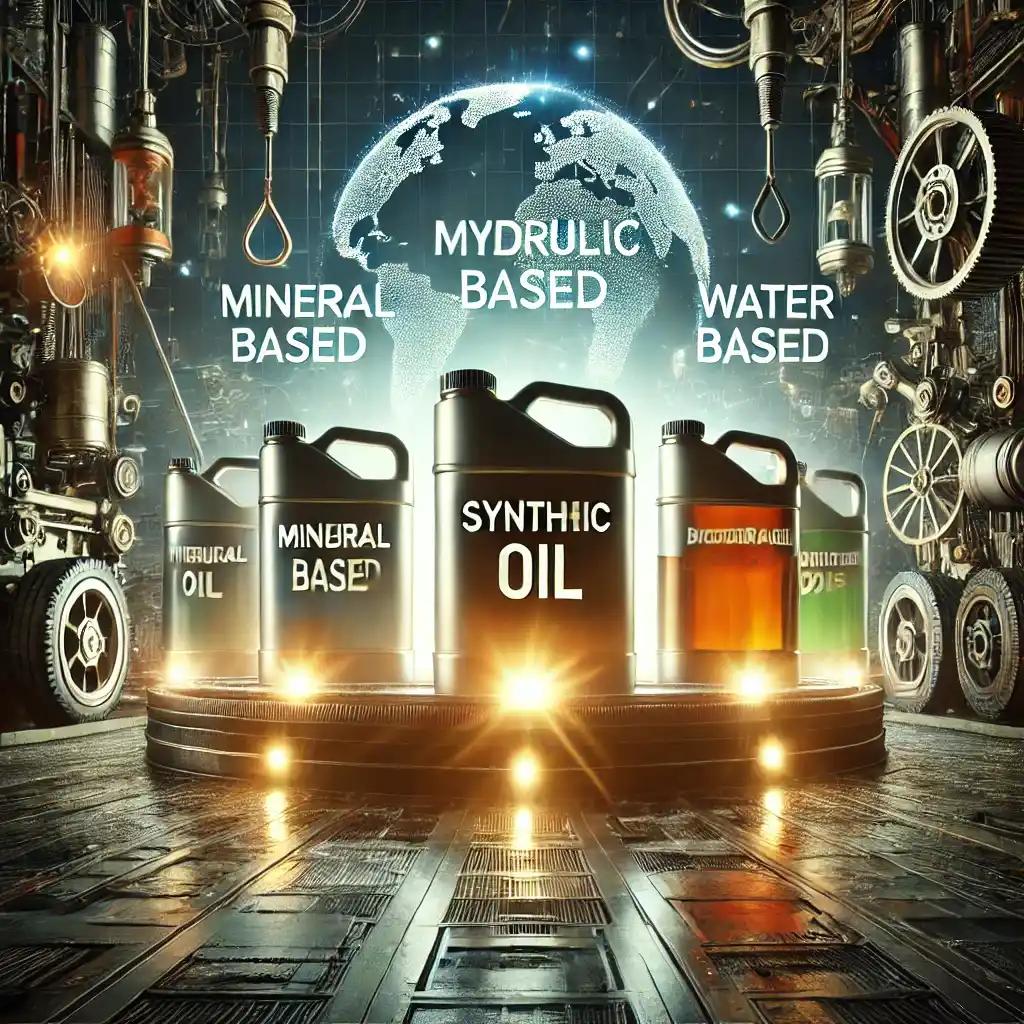Hydraulic oil is the lifeblood of hydraulic systems, ensuring smooth power transmission, reducing friction, preventing wear, and protecting components from corrosion. Choosing the right hydraulic oil type is essential for maintaining the efficiency and longevity of hydraulic machinery.
This guide explores various hydraulic oil types, their unique properties, applications, and key considerations when selecting the best option for your system.
Hydraulic oils are specially formulated fluids designed to transfer power while providing lubrication and cooling. They also prevent rust, oxidation, and foam formation, ensuring seamless operation of hydraulic systems.
The effectiveness of hydraulic oil depends on its viscosity, base oil composition, and additives, which determine its performance under different conditions.Various hydraulic oil types are available, each designed to meet specific operational requirements. The choice depends on factors like temperature range, pressure, load, and environmental impact.
Types of Hydraulic Oils
1. Mineral-Based Hydraulic Oil
Mineral-based hydraulic oils are the most commonly used hydraulic oil types, derived from refined crude oil. They offer good lubrication and protection at an affordable cost. These oils are available in different viscosity grades and may contain performance-enhancing additives.
Key Features:
✔ Cost-effective and readily available
✔ Good lubrication properties
✔ Suitable for standard hydraulic systems
✔ Requires periodic maintenance to prevent oxidation and sludge buildup
Common Applications:
✔ Industrial machinery
✔ Construction and earth-moving equipment
✔ Agricultural hydraulics
✔ Automotive hydraulic systems
Mineral-based hydraulic oil is ideal for applications that do not require extreme temperature or pressure resistance. However, regular monitoring and maintenance are necessary to prevent oxidation and sludge buildup.
Explore: Hydraulic oil uses
2. Synthetic Hydraulic Oil
Synthetic hydraulic oils are engineered using chemically synthesized base oils, providing superior performance in extreme conditions. These hydraulic oil types offer excellent resistance to oxidation, thermal breakdown, and viscosity changes.
Key Features:
✔ Performs well under extreme temperatures and high-pressure conditions
✔ Longer lifespan compared to mineral oil
✔ Provides excellent wear and corrosion protection
✔ Reduces maintenance costs due to extended oil change intervals
Common Applications:
✔ Aerospace and aviation hydraulic systems
✔ High-performance industrial machinery
✔ Heavy-duty construction equipment
✔ Marine and offshore applications
Synthetic hydraulic oils are ideal for operations that demand high efficiency and minimal maintenance. Their enhanced thermal stability makes them suitable for systems exposed to wide temperature fluctuations.
Explore: Is hydraulic oil combustible ?

3. Water-Based Hydraulic Oil
Water-based hydraulic oils are specifically formulated for applications requiring fire resistance. These oils contain a high percentage of water, reducing flammability risks in fire-sensitive environments.
Key Features:
✔ Excellent fire resistance properties
✔ Environmentally friendly compared to traditional oils
✔ Provides adequate lubrication and cooling
✔ Requires careful monitoring to prevent corrosion and microbial growth
Common Applications:
✔ Steel mills and foundries
✔ Underground mining equipment
✔ High-risk fire environments (e.g., power plants)
✔ Injection molding machines
Water-based hydraulic oils are suitable for industries where fire hazards are a concern. However, they require regular maintenance to prevent corrosion and ensure consistent performance.
4. Biodegradable Hydraulic Oil
Biodegradable hydraulic oils are environmentally friendly hydraulic oil types, often made from vegetable oils or synthetic esters. These oils minimize pollution risks and are used in applications where environmental regulations are strict.
Key Features:
✔ Non-toxic and biodegradable
✔ Reduces environmental impact
✔ Provides good lubrication and wear protection
✔ Slightly more expensive than mineral-based oils
Common Applications:
✔ Forestry and marine operations
✔ Agriculture and water-sensitive areas
✔ Environmentally regulated industries
✔ Construction projects near water bodies
Biodegradable hydraulic oils are an excellent alternative for industries prioritizing sustainability without compromising performance.
Key Considerations When Choosing Hydraulic Oil
When selecting a hydraulic oil type, consider the following factors:
✅ Viscosity: Affects flow and efficiency under different temperatures
✅ Additives: Enhance performance by providing anti-wear, anti-foaming, and oxidation resistance
✅ Temperature Range: Ensures proper functioning in extreme hot or cold conditions
✅ Pressure Requirements: Determines oil stability under high-pressure loads
✅ Environmental Impact: Consider biodegradable options if sustainability is a priority
Choosing the right hydraulic oil type improves equipment reliability, extends lifespan, and minimizes maintenance costs.

Frequently Asked Questions (FAQs)
1. What happens if I use the wrong hydraulic oil type?
Using the wrong hydraulic oil type can cause poor lubrication, overheating, reduced efficiency, increased wear and tear, and potential system failure. Always check manufacturer recommendations before selecting an oil.
2. Can I mix different types of hydraulic oil?
Mixing different hydraulic oil types is not recommended unless specified by the manufacturer. Different oils may have incompatible additives, leading to reduced performance, sludge formation, or system damage.
3. How often should hydraulic oil be changed?
Hydraulic oil change intervals depend on the type of oil, operating conditions, and system design. Generally, mineral oils need changing every 1,000 to 2,000 hours, while synthetic oils can last up to 4,000 hours or more. Regular oil analysis can help determine the right replacement schedule.
4. What are the signs that hydraulic oil needs replacing?
Common signs that hydraulic oil needs replacing include increased system noise, sluggish performance, overheating, discoloration, and contamination (water or dirt).
5. Can hydraulic oil go bad over time?
Yes, hydraulic oil can degrade due to oxidation, contamination, and thermal breakdown. Proper storage and regular oil analysis can help maintain its quality.
6. What is the difference between hydraulic oil and transmission fluid?
Hydraulic oil is primarily used for power transmission and lubrication in hydraulic systems, while transmission fluid is specifically formulated for automatic transmissions, providing friction control and cooling properties.
Final Thoughts
Understanding different hydraulic oil types is essential for optimizing the performance and longevity of hydraulic systems. Whether using mineral-based, synthetic, water-based, or biodegradable hydraulic oil, choosing the right type ensures smooth operation, reduced wear, and environmental safety.
Regular oil analysis, maintenance, and proper selection will enhance equipment efficiency, minimize downtime, and lower operational costs. By investing in the right hydraulic oil type, you ensure reliable and long-lasting performance for your hydraulic machinery.

